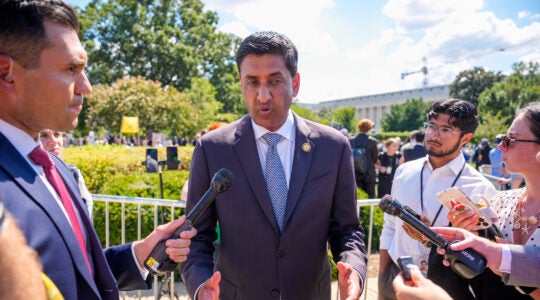WASHINGTON (JTA) — American Jews overwhelmingly disapprove of President Donald Trump in just about every area, scoring him lower than his predecessor even on topics like Israel, where Jewish approval of Barack Obama was relatively low, according to an American Jewish Committee poll.
The survey also shows a sharp uptick in concerns about anti-Semitism in the United States, which may be a reflection of the increased influence of the “alt-right” since Trump’s election.
Of respondents in the poll posted Wednesday by the AJC, 77 percent said they viewed Trump’s job performance unfavorably and 21 percent said they viewed him favorably. Those are considerably worse numbers for the president than in the general population at around the same time, mid- to late August, when Gallup consistently showed Trump scoring favorable ratings in the high 30s and unfavorable marks in the high 50s.
Asked for specifics, respondents scored Trump negatively across the board: 73 to 27 unfavorable to favorable on national security; 69-30 on terrorism; 75-23 on U.S.-Russia relations; 71-25 on handling the relationship with NATO and the trans-Atlantic alliance; 77-20 on race relations; 76-23 on immigration; and 68-26 on the Iran nuclear issue. He came out best on U.S.-Israel relations, though still unfavorable: 54-40.
That contrasted with Obama, who scored a dead heat on the U.S.-Israel relations the last time it was asked in this poll, two years ago: 49 percent disapproving and 48 approving, well within the margin of error of 4.7 percent. That survey was conducted after 18 months of tensions in the U.S.-Israel relationship, with the collapse of Israel-Palestinian talks in the spring of 2014. The month the poll was taken, in August 2015, Obama was pressing hard for the Iran nuclear deal, which Israel’s government and the centrist pro-Israel community vigorously opposed.
Trump has striven to make good relations with Israel a cornerstone of his foreign policy, and Israeli Prime Minister Benjamin Netanyahu openly prefers his presidency to that of Obama.
Jewish approval of the Iran deal in the 2015 poll was in a statistical dead heat, with 50 percent in favor and 47 percent opposed. Trump wants to scrap the deal, which trades sanctions relief for a rollback of Iran’s nuclear program. He may do so as soon as next month, when according to law, he must recertify Iranian adherence to the deal.
Jews continue to identify more as liberal and as Democrat than not. Among respondents, 54 percent said they were liberal, 22 percent classified themselves as moderate, and 22 percent said they were conservative. Party wise, 54 percent said they were Democrats, 15 percent said they were Republicans and 20 percent Independent. Asked whether they voted in November for Trump or Hillary Clinton, the Democratic candidate, the numbers were statistically commensurate with how respondents in the AJC poll from a year ago — focusing almost exclusively on the election — said they would vote: 64 percent said they voted for Clinton and 18 percent for Trump. Last year the numbers were 61-19.
Republicans who believe a candidate more conventional than Trump could score better may take comfort in what this year’s poll reported regarding Vice President Mike Pence, who has a longstanding relationship with the organized pro-Israel community: His unfavorable-favorable rating, 62-30, was more in line with how Jews have voted in recent years than Trump’s negatives.
The poll shows a further erosion of U.S. Jewish approval of Netanyahu, who once polled consistently favorably among American Jews. In 2015, the last time the question was asked, U.S. Jews approved of Netanyahu’s handling of the U.S.-Israel relationship, 57-42. This year, it’s a statistical dead heat, with respondents disapproving 47 percent to 45 percent approving. Netanyahu has come under fire in recent months from major U.S. Jewish groups for reneging on pledges to loosen restrictions on the practice in Israel of non-Orthodox streams of Judaism.
Asked as in years past how respondents perceive anti-Semitism in the United States, the numbers on the surface show consistency: 84 percent see it as a problem this year, while 16 percent do not. That jibes with 85 percent in 2015 who saw it as a problem, higher than the 73 percent scored last year.
There is a notable spike, however, on closer examination: The number who classified the anti-Semitism problem in the United States as “very serious” soared to 41 percent this year from the 21 percent of the past two polls. That may result from associations between Trump and the “alt-right,” a grouping of anti-establishment conservatives who include within their ranks anti-Semites, as well as Trump’s equivocation on condemning anti-Semitism and bigotry, most recently last month when a white supremacist march in Charlottesville, Virginia, ended in deadly violence.
The other notable increase was in which nation posed the “single greatest danger” to the United States. North Korea, which has intensified its nuclear testing as tensions ratchet up with the Trump administration, was by far the leader this year at 57 percent. Next was Russia at 22 percent — a result perhaps of intensified coverage of Russia’s attempts to interfere in last year’s election.
In 2015, the last time a similar question was asked, the highest scorer was the Islamic State, the terrorist group, at 51 percent. Also known as ISIS, it did not appear as an option this year. The order behind the Islamic State that year was China (13 percent), Russia (10 percent), Iran (9.5 percent) and North Korea (6 percent), the last of five listed.
The telephone poll of 1,000 respondents was conducted by SSRS, a research firm, from Aug. 10 to 28. It has a margin of error of 3.71 percent.
JTA has documented Jewish history in real-time for over a century. Keep our journalism strong by joining us in supporting independent, award-winning reporting.






